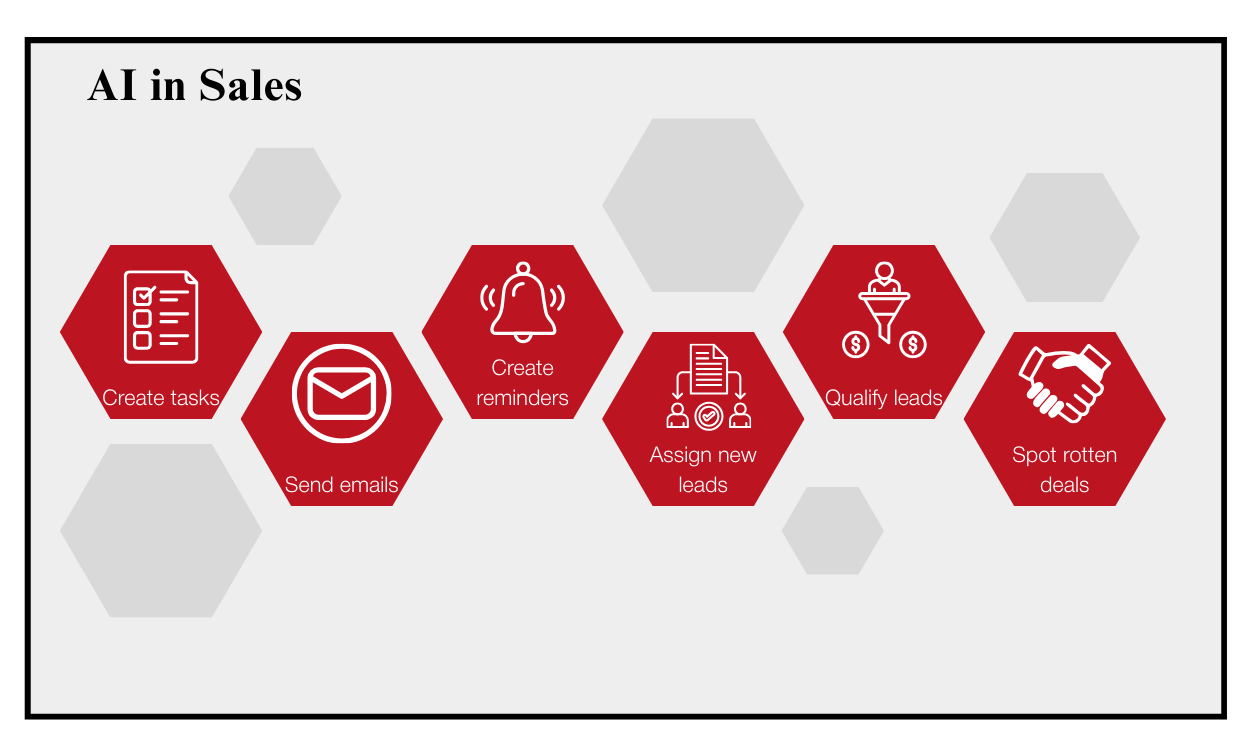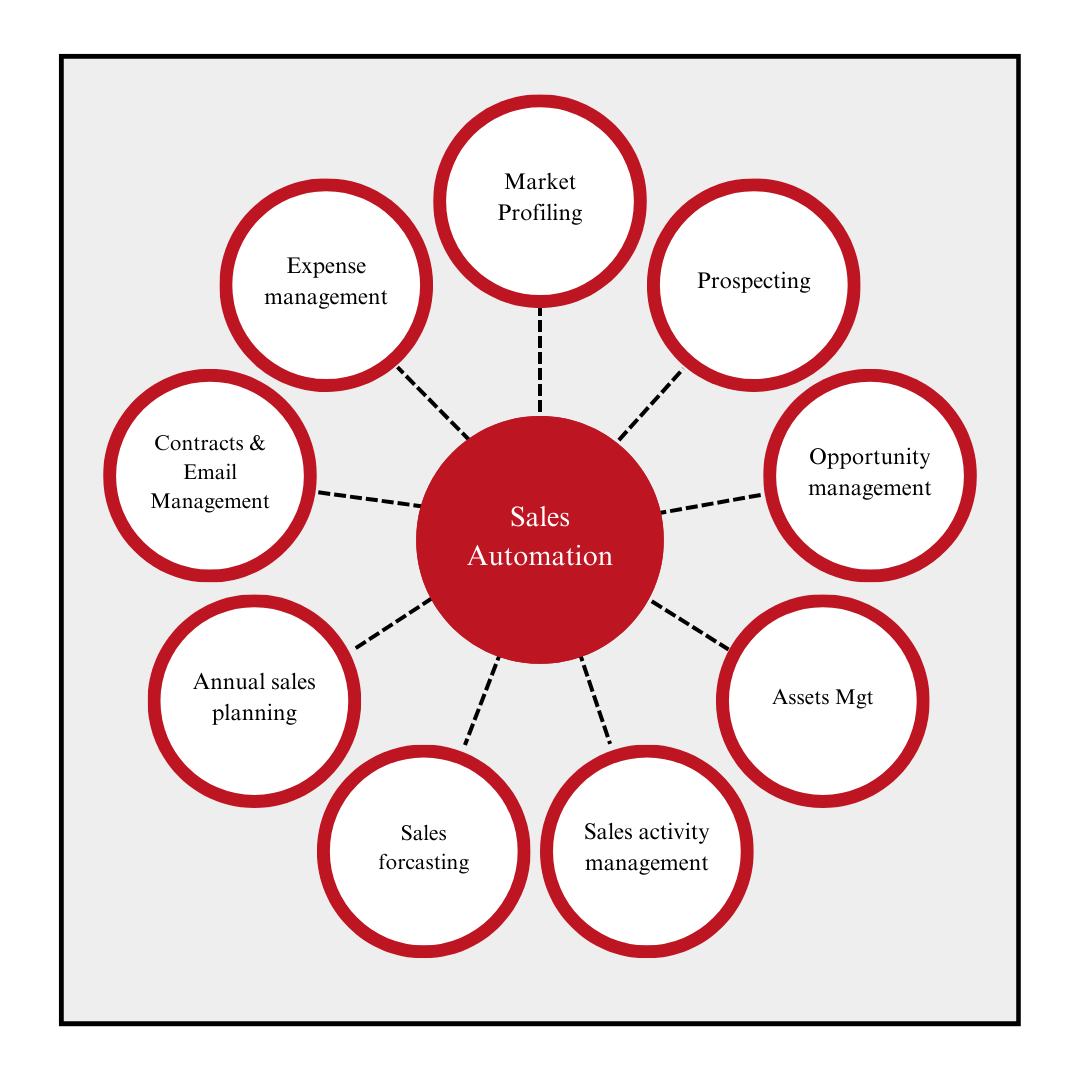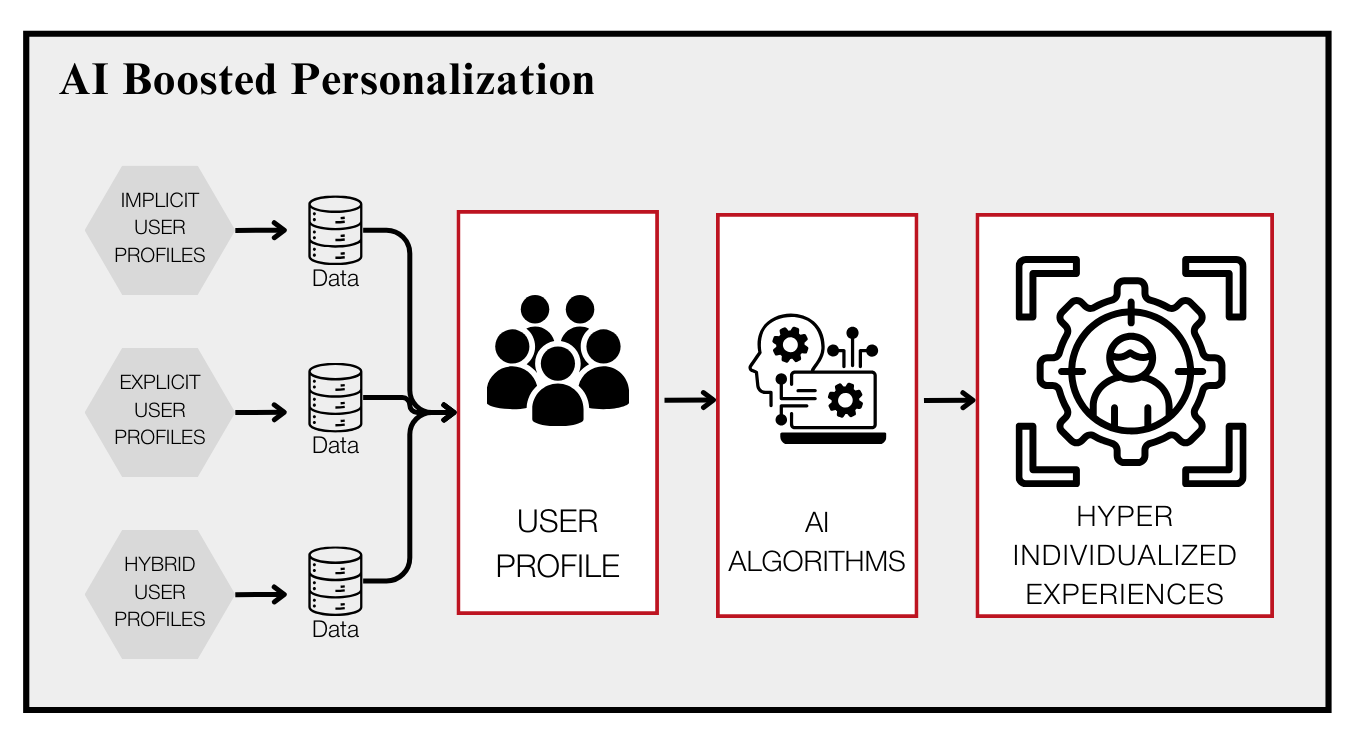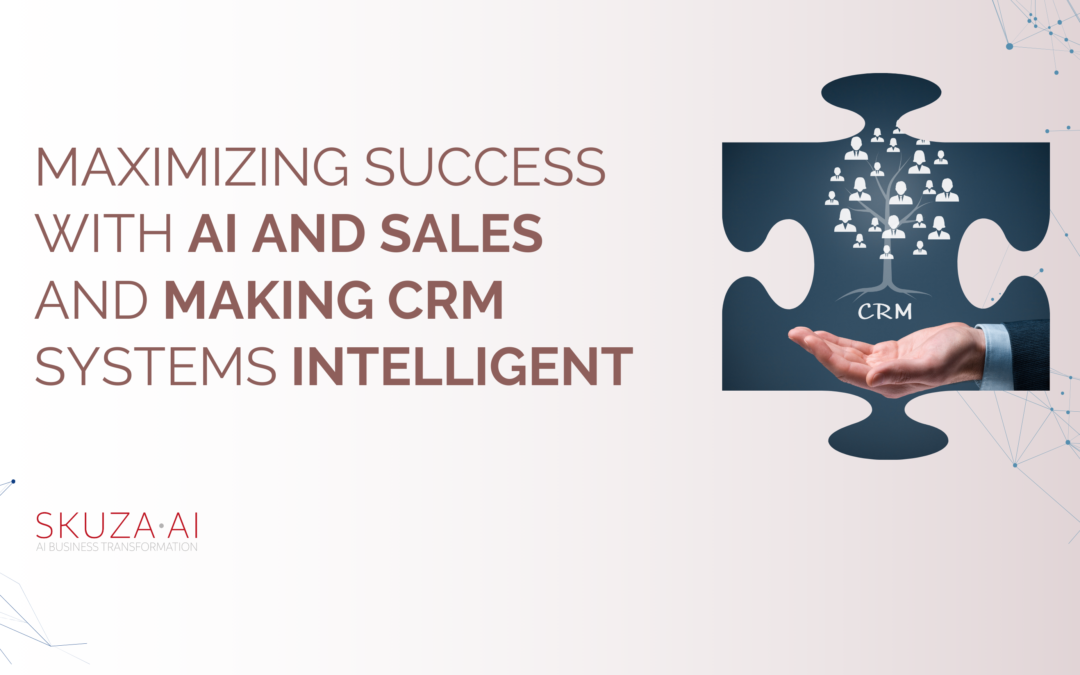Maximizing Success with AI and Sales and Making CRM Systems Intelligent
How is AI revolutionizing sales? AI integration into sales processes enhances efficiency, accuracy, and provides meaningful insights. In this article, discover how AI and sales strategies continue to evolve in 2024, including machine learning applications, sales call enhancements, and personalized customer interactions.
Key Takeaways
- Embrace AI as a vital tool in sales to boost efficiency, streamline processes, and enhance customer relationships.
- Utilize machine learning for better lead generation and personalization, allowing sales teams to focus on high-value activities.
- Implement clear goals and closely monitor AI performance to ensure alignment with business objectives and optimize sales strategies.
Understanding AI in Sales

Companies can greatly enhance their sales processes by harnessing the power of AI. At its core, artificial intelligence involves computerized technology designed to perform cognitive tasks, such as learning, reasoning, and problem-solving, which significantly impacts sales efficiency and effectiveness. As sales professionals, we’re just scratching the surface of AI’s potential, primarily using it for context creation.
AI’s transformative effects make it an indispensable tool for sales and business professionals. Technologies like machine learning and natural language processing are key components of AI that help streamline tedious processes for sales professionals, making their work more effective. Early adopters of AI have seen exponential sales increases by simplifying or optimizing various sales processes.
AI in sales enhances efficiency and effectiveness while lowering costs. Acting as an assistant rather than a replacement, AI preserves the personal touch in sales, transforms customer relationships, and simplifies the lives of sales representatives. This revolution to the traditional sales process is part of the Fourth Industrial Revolution, driven by AI’s sophisticated and ubiquitous nature in sales.
The Role of Machine Learning in Sales
Machine learning, a subset of AI, is pivotal in transforming sales processes. Machine learning enhances lead generation by analyzing customer data, identifying high-potential leads, and capturing them in real-time as they engage with digital platforms. Integrating these models with CRM systems streamlines lead management, making the sales process more efficient.
A significant benefit of machine learning is its ability to automate lead generation, reduce manual effort, and enhance accuracy. Machine learning algorithms improve lead scoring by predicting which leads will most likely convert into customers. This automation allows sales reps to focus on high-value activities like building relationships and closing deals.
Machine learning also improves lead nurturing by analyzing data to predict customer behavior and preferences, enabling more personalized interactions. It can find patterns and suggest the next best actions for sales reps, setting the tone and subject of their conversations based on comprehensive data analysis. This capability is crucial in today’s fast-paced sales environment, where timely and relevant interactions can make all the difference.
Enhancing Sales Calls with AI
AI has revolutionized sales calls, provides tools that offer sentiment analysis, extracts key insights, and delivers real-time coaching. These capabilities help sales teams enhance their interactions, making each sales call more productive and effective.
Sentiment Analysis
Natural language processing allows AI to assess and interpret customer emotions during sales interactions, providing valuable insights into customer behavior. AI transcribes calls in real time and analyzes sentiment based on customer statements, identifying indicators of negative sentiment like “I’m confused” or “I’m frustrated.” This real-time sentiment analysis enables sales leaders to monitor multiple active sales calls and decide if intervention is necessary.
Generative AI is crucial in effectively identifying customer sentiment during sales calls. By spotting negative sentiments, sales teams can access real-time transcripts for context, ensuring they address customer concerns promptly. This capability helps maintain a high level of customer satisfaction and enhances the overall effectiveness of sales calls.
Key Insights from Conversations
AI tools can analyze sales performance metrics like customer satisfaction and win rates, providing key insights that inform sales strategies. AI delivers real value by converting recorded conversations to text and analyzing discussed topics, helping sales professionals better understand customer needs and preferences.
These insights are derived from thousands of recorded conversations, with customer consent, analyzed by AI to uncover patterns and trends. Such analysis helps sales teams identify areas of improvement and tailor their strategies to meet customer expectations, ultimately enhancing customer relationships and driving sales opportunities.
Real-Time Coaching
AI offers real-time suggestions and feedback to sales reps during calls, significantly enhancing communication effectiveness. By providing immediate feedback on conversation dynamics, AI helps sales reps adjust their approach and improve their performance in real-time.
Personalized coaching is another benefit, as AI analyzes sales rep interactions and offers tailored feedback. This real-time coaching helps sales reps refine their skills, leading to more effective sales calls and better customer interactions. It also supports customer success teams in ensuring high-quality communication and customer satisfaction.
Automating Sales Activities

AI-driven automation significantly enhances sales efficiency by automating various activities, including prospecting, follow-ups, and proposals. This automation allows sales representatives to concentrate on relationship-building and strategic activities, ultimately boosting productivity and sales performance. According to McKinsey, sales professionals that have adopted AI have increased leads and appointments by about 50%.
Data Entry Automation
Automated logging of activities in CRMs allows sales representatives to focus on client interaction rather than tedious record-keeping. The integration of AI significantly reduces the required manual data entry, alleviating the burden of repetitive tasks. This automation ensures that sales reps can dedicate more time to selling and less to administrative duties.
AI’s ability to analyze customer data and provide suggestions for the best possible actions enhances the efficiency of sales professionals. These improvements in data management lead to more accurate CRM entries, ensuring that sales teams have the information they need to make informed decisions.
Task Management
AI discerns patterns in activities leading to closed deals, helping sales teams manage and prioritize tasks effectively. By uncovering risks and exposing inefficiencies, AI tools ensure that sales reps can focus on high-value activities that drive sales. Generative AI also qualifies hot leads and passes them to reps from the website, streamlining the lead qualification process.
Moreover, AI summarizes lead opportunities and CRM records to identify the likelihood of closing a deal, providing sales reps with actionable insights. This task management capability allows sales reps to concentrate on closing deals and nurturing customer relationships, enhancing overall sales effectiveness.
AI-Powered Sales Forecasting
AI-powered sales forecasting leverages sophisticated algorithms to analyze historical data, predict future market trends, and provide real-time insights. This enhances the accuracy of sales forecasts, helping sales teams identify upselling and cross-selling opportunities based on customer behavior.
Predictive Analytics
Predictive analytics in AI identifies buying signals and leverages historical sales data to forecast future trends, enhancing sales forecasting accuracy. AI platforms like Clari provide predictive forecasts that help sales teams project their performance accurately. This capability enables businesses to make better-informed plans for future investments and supply demands.
By analyzing data and identifying patterns, predictive analytics helps sales teams anticipate customer needs and preferences, allowing them to tailor their strategies accordingly. This proactive approach ensures that sales teams are always one step ahead, ready to meet customer demands and capitalize on sales opportunities.
Sales Pipeline Management
AI enhances sales pipeline management by analyzing customer behaviors and providing actionable insights for sales strategies. During sales calls, generative AI can reveal objections, competitor mentions, and attitudes on pricing, allowing sales teams to adjust their strategies accordingly.
Tracking call center activity provides insights that help with sales forecasting and competitor monitoring. Establishing key performance indicators (KPIs) is essential for measuring the impact of AI tools on sales performance, ensuring that sales teams can continuously optimize their efforts and achieve better results.
Personalizing Customer Interactions with AI

AI personalizes customer interactions by analyzing detailed customer data to create specific messaging and experiences tailored to individual preferences. This personalization leads to improved customer satisfaction and stronger business relationships.
Personalized Outreach
Generative AI creates targeted copy for prospecting emails and can analyze customer preferences to improve interactions. By drafting personalized emails based on customer data and interaction history, AI increases customer engagement and drives better relationships. This tailored approach ensures that each customer feels valued and understood.
Generative AI can also produce various types of content, such as product descriptions, marketing materials, and case studies, enhancing communication efforts. This versatility in content creation allows sales teams to maintain consistent and personalized outreach, fostering stronger customer relationships and increasing the likelihood of sales success.
Custom Communication Strategies
AI helps sales teams develop customized communication plans that align with customer preferences and expectations. By adjusting strategies in real time based on customer feedback and interactions, AI enhances engagement and ensures that communication remains relevant and effective. This dynamic approach leads to increased customer satisfaction and loyalty.
Personalized communication through AI ultimately contributes to higher sales performance. By understanding customer behavior and tailoring messages accordingly, sales teams can build trust and credibility, leading to long-term customer relationships and sustained business growth.
Leveraging AI for Sales Enablement
AI supports sales enablement by providing tools and insights for training, development, and performance analytics. Automating tasks and making data visible to sales, marketing, and customer success teams, AI enhances collaboration and productivity.
Training and Development
Generative AI creates customized training programs based on individual needs, improving seller onboarding and training by incorporating specific value propositions and successful sales techniques. These tailored programs ensure new sales development representatives (SDRs) receive the necessary skills and knowledge to excel in their roles.
Additionally, generative AI creates and iterates effective sales scripts based on real-time feedback and generates tailored action plans for customers and sales processes. This continuous improvement in training materials leads to greater agent adherence, resulting in higher pipeline and revenue.
Sales reps should feel comfortable asking questions or requesting extra help when adapting to AI technology.
Performance Analytics
AI provides real-time performance monitoring tools that track individual and team metrics, enabling immediate assessment of sales activities. Analytics platforms like Dialpad offer insights such as call activity statistics and representative leaderboards, which are essential for informed decision-making. These tools help sales managers recognize high achievers and provide targeted coaching to improve overall sales performance.
Collecting user feedback can help refine AI tool functionalities and maximize their effectiveness, leading to continuous improvement in sales performance. Monitoring sales performance is crucial for understanding how effectively the sales team operates and identifying improvement areas.
AI Tools Transforming Sales Operations
Several acclaimed AI sales tools are emerging as essential for enhancing sales operations. These tools automate contact and activity capture, reducing manual entry and errors while providing accurate activity data on customer interactions.
CRM Integration
Salesforce’s Einstein 1 Platform integrates generative AI with CRM systems for improved data management and seamless sales workflows. Dialpad’s CRM integration assists sales teams in logging their activities efficiently, leading to enhanced productivity and efficiency in sales operations.
These CRM and AI integrations ultimately lead to better customer data management, improved sales workflows, and increased productivity for sales teams. With automated repetitive tasks and accurate CRM entries, sales reps can focus on high-value activities that drive sales success.
Advanced Sales Platforms
AI-driven sales platforms are crucial for providing real-time, accurate data and insights that help sales teams manage their pipelines effectively. Clari assists sales teams by pulling data from multiple sources to produce accurate and real-time pipeline management, along with forecasting and revenue intelligence. This comprehensive approach ensures sales teams have the information they need to make strategic decisions and optimize their efforts.
Aviso enhances sales insights by analyzing deals and pipeline data, while generative AI improves sales presentations by creating tailored decks and analyzing audience reactions. As the number of generative AI tools increases, their ability to learn and imitate will lead to more sophisticated sales solutions, further transforming sales operations.
Implementing AI in Your Sales Strategy
Implementing AI in your sales strategy involves setting clear goals, choosing the right AI tools, and continuously monitoring and evaluating their performance. Establishing clear objectives and aligning AI strategies with business goals ensures that the technology effectively addresses specific sales challenges.
Setting Clear Goals
Knowing what you want to achieve is essential to starting with AI in sales. Sales teams should define achievable milestones to measure progress during AI implementation and communicate their expectations regarding AI’s role in achieving sales outcomes. It’s important to understand that integrating AI in sales is a long-term strategy, and results may not be immediate.
Having clear, attainable, and measurable sales objectives helps ensure that AI implementation aligns with overall business goals and drives growth and efficiency. This alignment is crucial for maximizing the benefits of AI and achieving desired sales outcomes.
Choosing the Right AI Tools
Sales teams should focus on identifying the AI tools that suit their unique needs and align with their specific sales processes. Customizing AI solutions ensures that they effectively address the unique challenges and requirements of the business.
Choosing the right AI tools is crucial for maximizing their effectiveness in sales. By choosing tools that align with business needs and processes, sales teams can ensure a successful implementation that drives productivity and sales performance.
Monitoring and Evaluation
Monitoring the performance of AI tools and their impact on sales metrics is crucial for evaluating success. Collecting feedback from both the sales team and customers helps identify areas for improvement and ensures that AI tools provide value. Regular updates and retraining of generative AI tools with new data help maintain their effectiveness and accuracy.
Continuous monitoring and evaluation enable sales teams to optimize their AI strategies and ensure the tools are aligned with their sales objectives. This ongoing process is essential for achieving long-term success with AI in sales.
Summary
In 2024, maximizing success with AI in sales involves understanding its role, leveraging its capabilities to enhance sales calls, automating activities, personalizing customer interactions, and implementing AI tools effectively. By setting clear goals, choosing the right tools, and continuously monitoring their performance, sales teams can harness the full potential of AI to drive efficiency, effectiveness, and growth. Embrace the transformative power of AI and lead your sales team to unprecedented success.
Sources:
https://www.mailmodo.com/guides/ai-personalization-marketing/

